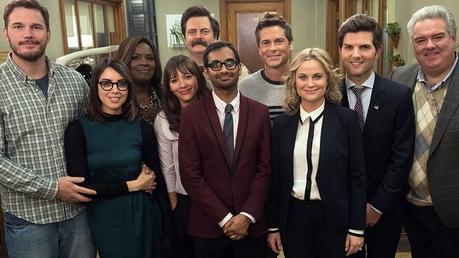
I’ve often called Parks and Recreation my happy place, a show that reliable cheers me up and has frequently been a source of comfort during difficult times. This is why I’ve barely written about it – what the show is, above everything else, is a feeling, a complex light and very unlikely emotion. I loved Parks and Recreation a lot, and I am endlessly glad about its seventh season, which is one of the few examples of a story, told in serialized form on television, being told the way it was intended to and finished with all the grace and dignity that it deserved. It’s such an unlikely ending – a victory lap, clearly, both for everybody directly involved in making the show and the fans who stuck with it, coming back every week – considering that for several seasons, Parks always ended in a finale that could have worked as a final point for the serial as a whole, just in case. Other shows would have struggled with that format, but it served Parks incredibly well, and those final episodes for each season are not just the high points, but also always a culmination of everything that the show did best. They are celebrations, and at the same time, open up all the possibilities for how the story could continue (both in terms of careers and personal relationships) – and in many ways, this final final episode isn’t any different. It’s been frequently compared to Six Feet Under, with the time jumps and the scenes from a future years ahead of all the characters, but the decisive difference between seeing the last few moments in the lives of each character (which was a perfect way to end a show that was about the inevitability of death and how it affects lives) and seeing them at important stages in the future is just that: everything is still possible (except for Jerry Gergich, who has truly lived life to the fullest of its possibilities, and is therefore fondly remembered in death). One Last Ride fulfils all the promises but never closes the doors, ultimately creating the best possible outcome – Pawnee, and all its residents, will still be there, even if the stories are no longer televised, and Leslie Knope’s arc continues beyond the end of the show. It’s the best way to end a show that was so very much about creating a whole lively world, filled with individuals in all their more or less loveable weirdness. Short of the luxury of just continuing into eternity (which seems to be true for the Simpsons – Springfield was often mentioned as a blueprint for Pawnee), it’s the best way to do this. It opens up the future, and it makes memories of the past even fonder, even of season one, before the show realized that Leslie Knope (and Amy Poehler) were its biggest strength, not a weakness. Looking back, it seems absurd to think that anyone ever considered it a good idea to base a show on the premise that we are laughing at Leslie Knope, rather than cackling with her, and it is all the more magical how completely the show eventually managed to overcome that initial weakness. It’s hard to think of Parks and Recreation just in terms of one strength (it had – almost – all the strengths), but the two things that stand out above all is the idea that these central characters cared so much about each other and what they did, and when they were in danger of not caring enough, Leslie reliably stepped in to remind them of how important they, and therefore their place in the world, were, and how much that mutual love and respect can be transformative both for a place and the people in it, even if Pawnee never ceased to be the chaotic, ridiculous place that it was always meant to be, at its best and worst during public debates. Leslie insisted that the Parks and Recreation department, so inherently linked to the place, could make a difference in everybody’s life, could create a better place, and as thankless as that realized ambition mostly was (Leslie Knope never got a Buffy Summeresque prom speech from the town of Pawnee), the fact that Ron Swanson loved her, despite their radical ideological differences, speaks volumes. It also speaks volumes that Parks and Recreation chose to tell the story about a radical libertarian and someone who genuinely believes that government can do good in people’s lives when it gets involved becoming friends, and respecting each other so much that the ideological difference doesn’t matter – or that Leslie’s arguments, and her ability to connect the people she loves with the causes she loves, manages to transcend these differences. Considering how unforgiving and seemingly impossible to overcome the line between the different political parties were during the same time that Parks completed its seven year run were, the premise at its center almost seems utopian. At the same time, it never shied away from being outspoken and sarcastic in a devastating way about the present, calling out the ridiculousness of the so-called man’s right movement, the power of corporations, the dangers of a political process dominated by money. The show also succeeded in making politics personal: Leslie Knope never seeks power for the sake of it, she seeks it as an idealist, with her goals mapped out in her head, and as the show and her career progressed, she got better at comprehending other people’s ambitions and strengths. One of the best arcs of the show is April Ludgate’s self-realization, and Leslie’s learning curve in trying to be supportive of April without either unsuccessfully trying to shape her into something resembling herself, or smothering her. Regardless of what position Leslie Knope ended up having that justified her having Secret Service protection at Jerry’s funeral (I like to believe it was the presidency, because it’s what I believed the show was going towards for seasons before it actually happened), one of her biggest successes is realizing that April will never be a younger version of herself, but someone who has her own, different kind of ambition, and a strong desire to realize herself in a job that does not constantly frustrate her. April was often used as a role model for not caring (wrongly, since even early on, one of her best moments – the 15 layers of irony – was all about calling someone else out for not caring enough), but in fact she cared so much that the process of figuring out how to best put that ambition into practice, how to find a life that would allow her to grow and affect change, took up most of the later seasons of the show. Another strength of the show, taking characters seriously while also using them for their comic potential, without allowing that humor to undermine them. Tom Haverford and his business ventures, never fully hiding the fact that his ambition for success and money was a way of hiding a deep insecurity. Andy Dwyer, slowly remaking himself into a sort of fully grown man after living in a pit with only rats for company, occasionally wiser than everyone else. Ron Swanson, more stubborn than everyone else – so much that one of the greatest arcs of the final season was about how he loved Leslie Knope too much, so that his inability to put that love into words created a terrible conflict lasting for months. This is what Parks and Recreation is, and will always be: a show about community, caring too much, a show refuting the idea that cynicism is the only way to approach the human condition, a show about friendship and love and the transformative power of building something together, regardless of whether it is only a tiny park in the backlot of your best friend’s house or a whole national park where your other best friend can go canoeing undisturbed by the terrors of modern life.
Parks and Recreation, 2009-2015, starring Amy Poehler, Nick Offerman, Aubrey Plaza, Rashida Jones, Chris Pratt, Azis Ansari, Retta, Jim O'Heir, Adam Scott, Jay Jackson.

